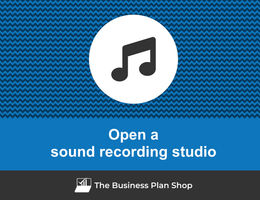How to create a financial forecast for a sound recording studio?
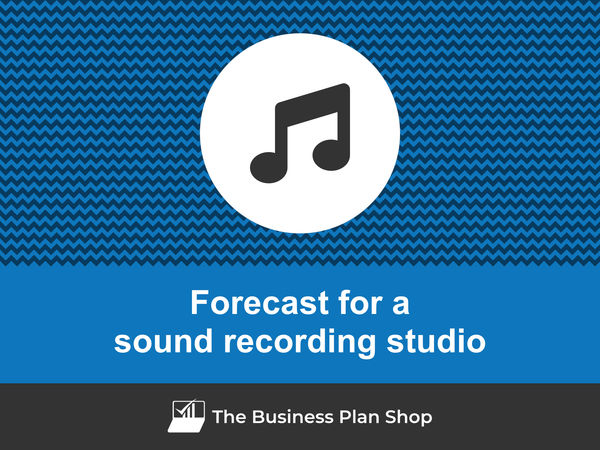
Creating a financial forecast for your sound recording studio, and ensuring it stays up to date, is the only way to maintain visibility on future cash flows.
This might sound complex, but with the right guidance and tools, creating an accurate financial forecast for your sound recording studio is not that hard.
In this guide, we'll cover everything from the main goal of a financial projection, the data you need as input, to the tables that compose it, and the tools that can help you build a forecast efficiently.
Without further ado, let us begin!
Why create and maintain a financial forecast for a sound recording studio?
The financial projections for your sound recording studio act as a financial blueprint to guide its growth with confidence and ensure its long-term financial viability.
To create them, you will need to look at your business in detail - from sales to operating costs and investments - to assess how much profit it can generate in the years to come and what will be the associated cash flows.
During challenging market conditions, maintaining an up-to-date financial forecast enables early detection of potential financial shortfalls, allowing for timely adjustments or securing financing before facing a cash crisis.
Your sound recording studio's financial forecast will also prove invaluable when seeking financing. Banks and investors will undoubtedly request a thorough examination of your financial figures, making precision and presentation essential.
Need a convincing business plan?
The Business Plan Shop makes it easy to create a financial forecast to assess the potential profitability of your projects, and write a business plan that’ll wow investors.

What information is needed to build a sound recording studio financial forecast?
The quality of your inputs is key when it comes to financial modelling: no matter how good the model is, if your inputs are off, so will the forecast.
If you are building a financial plan to start a sound recording studio, you will need to have done your market research and have a clear picture of your sales and marketing strategies so that you can project revenues with confidence.
You will also need to have a clear idea of what resources will be required to operate the sound recording studio on a daily basis, and to have done your research with regard to the equipment needed to launch your venture (see further down this guide).
If you are creating a financial forecast of an existing sound recording studio, things are usually simpler as you will be able to use your historical accounting data as a budgeting base, and complement that with your team’s view on what lies ahead for the years to come.
Let's now zoom in on what will go in your sound recording studio's financial forecast.
The sales forecast for a sound recording studio
The sales forecast, also called topline projection, is normally where you will start when building your sound recording studio financial forecast.
Creating a coherent sales projection boils down to estimating two key drivers:
- The average price
- The number of monthly transactions
To do this, you will need to rely on historical data (for an existing business), market research data (for both new and existing sound recording studios), and consider the elements below:
- Competition: The number of competing sound recording studios in your area can significantly impact your average price and number of monthly transactions. If there are many other studios offering similar services, you may need to lower your prices or offer promotions to attract customers. On the other hand, if there are only a few competitors, you may be able to charge higher prices and still maintain a steady flow of customers.
- Technology: Advancements in technology can greatly affect the average price and number of monthly transactions in a sound recording studio. For example, if a new recording software is released that allows for easier and higher quality recordings, you may need to adjust your prices to stay competitive. Additionally, if your studio is not equipped with the latest technology, customers may choose to go to another studio with better equipment.
- Trends in Music Industry: The current trends in the music industry can also impact your business's sales forecast. For example, if there is a rise in demand for a specific genre of music that your studio specializes in, you may see an increase in the number of monthly transactions and be able to charge higher prices. On the other hand, if the industry shifts towards a different genre, you may need to adjust your services and prices accordingly.
- Quality of Services: The quality of your services can greatly affect your average price and number of monthly transactions. If your studio consistently produces high-quality recordings, you may be able to charge higher prices and attract more customers through word-of-mouth recommendations. However, if the quality of your recordings is not up to par, customers may choose to go to a different studio, resulting in a decrease in transactions and lower prices.
- Economic Conditions: The state of the economy can also play a role in your sales forecast. During times of economic downturn, people may cut back on non-essential expenses, such as recording studio sessions, resulting in a decrease in transactions and a need to lower prices. In contrast, during times of economic growth, people may be more willing to spend money on recording services, allowing you to charge higher prices and potentially see an increase in transactions.
After the sales forecast comes the operating expenses budget, which we will now look into in more detail.
Need a convincing business plan?
The Business Plan Shop makes it easy to create a financial forecast to assess the potential profitability of your projects, and write a business plan that’ll wow investors.

The operating expenses for a sound recording studio
Once you know what level of sales you can expect, you can start budgeting the expenses required to operate your sound recording studio on a daily basis.
Expenses normally vary based on how much revenue you anticipate (which is why, from experience, it is always better to start your forecast with the topline projection), and where your business is based.
Operating expenses for a sound recording studio will include some of the following items:
- Staff costs: This includes the salaries, benefits, and taxes for all employees working in the sound recording studio, such as sound engineers, producers, and administrative staff.
- Accountancy fees: You will need to hire an accountant or bookkeeper to manage your financial records and ensure that your taxes are filed correctly.
- Insurance costs: It is important to have insurance coverage for your studio, including property insurance, liability insurance, and workers' compensation insurance.
- Software licenses: You will need to purchase licenses for recording software, editing software, and other programs used in the sound recording process.
- Banking fees: These include fees for maintaining a business bank account, wire transfers, and credit card processing fees.
- Rent: If you do not own the building where your studio is located, you will have to pay rent to the landlord.
- Utilities: This includes electricity, water, and gas fees for running the equipment and maintaining a comfortable environment for recording.
- Equipment maintenance: It is important to regularly service and maintain your recording equipment to ensure its proper functioning.
- Marketing and advertising: You will need to allocate funds for promoting your studio and attracting new clients.
- Professional fees: This includes fees for legal services, consulting, and any other professional services that you may require.
- Office supplies: You will need to purchase supplies such as paper, ink, and other office supplies for administrative tasks.
- Training and development: To stay competitive in the industry, you may need to invest in training and development for yourself and your employees.
- Travel expenses: If you need to travel for business purposes, you will need to budget for transportation, accommodation, and meals.
- Music licensing fees: If you plan to use copyrighted music in your recordings, you will need to obtain licenses and pay fees to the appropriate organizations.
- Repairs and renovations: Over time, you may need to make repairs or renovations to your studio, which can be costly.
This list will need to be tailored to the specificities of your sound recording studio, but should offer a good starting point for your budget.
What investments are needed to start or grow a sound recording studio?
Creating and expanding a sound recording studio also requires investments which you need to factor into your financial forecast.
Capital expenditures and initial working capital items for a sound recording studio could include elements such as:
- Recording Equipment: This includes items such as microphones, audio interfaces, mixing consoles, and speakers. These are essential for recording and producing high-quality audio.
- Studio Furniture: This includes items such as chairs, desks, and storage units. A comfortable and organized studio space is important for productivity and creativity.
- Soundproofing Materials: These materials are necessary for creating a professional and acoustically sound recording environment. This may include acoustic panels, sound-absorbing foam, and soundproof doors and windows.
- Instrument and Gear Upgrades: As a recording studio, it's important to constantly update and upgrade your instruments and gear to keep up with industry standards and meet the needs of your clients.
- Software and Plugins: Recording software and plugins are essential for editing, mixing, and mastering audio. These can be expensive, but they are necessary for creating high-quality recordings.
Again, this list is not exhaustive and will need to be adjusted according to the circumstances of your sound recording studio.
Need a convincing business plan?
The Business Plan Shop makes it easy to create a financial forecast to assess the potential profitability of your projects, and write a business plan that’ll wow investors.

The financing plan of your sound recording studio
The next step in the creation of your financial forecast for your sound recording studio is to think about how you might finance your business.
You will have to assess how much capital will come from shareholders (equity) and how much can be secured through banks.
Bank loans will have to be modelled so that you can separate the interest expenses from the repayments of principal, and include all this data in your forecast.
Issuing share capital and obtaining a bank loan are two of the most common ways that entrepreneurs finance their businesses.
What tables compose the financial plan for a sound recording studio?
Now let's have a look at the main output tables of your sound recording studio's financial forecast.
The profit & loss forecast
The forecasted profit & loss statement will enable you to visualise your sound recording studio's expected growth and profitability over the next three to five years.
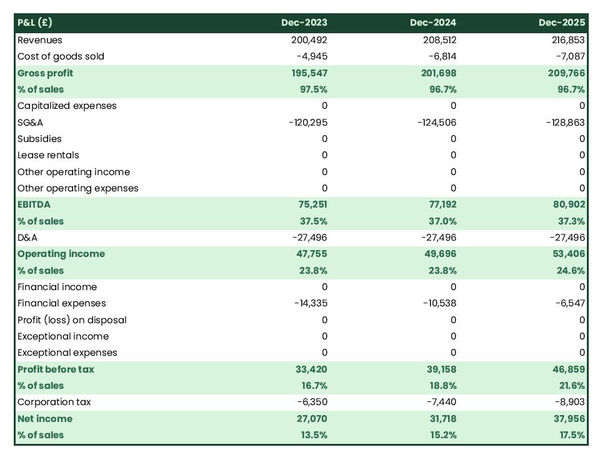
A financially viable P&L statement for a sound recording studio should normally show:
- Sales growing above inflation
- Stable or expanding (ideally) profit margins
- A net profit
This will of course depend on the stage of your business: a new venture might be loss-making until it reaches its breakeven point in year 2 or 3, for example.
The projected balance sheet
The projected balance sheet gives an overview of your sound recording studio's financial structure at the end of the financial year.
It is composed of three categories of items: assets, liabilities and equity:
- Assets: are what the business possesses and uses to produce cash flows. It includes resources such as cash, buildings, equipment, and accounts receivable (money owed by clients).
- Liabilities: are the debts of your sound recording studio. They include accounts payable (money owed to suppliers), taxes due and bank loans.
- Equity: is the combination of what has been invested by the business owners and the cumulative profits to date (which are called retained earnings). Equity is a proxy for the value of the owner's stake in the business.
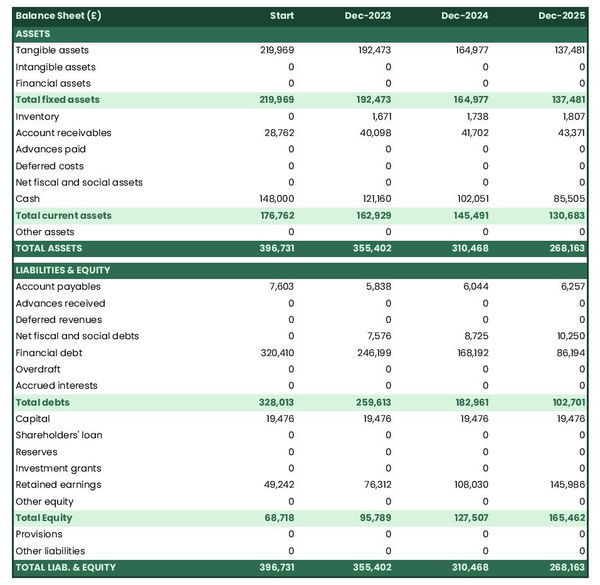
The cash flow forecast
Your sound recording studio's cash flow forecast shows how much cash your business is expected to consume or generate in the years to come.
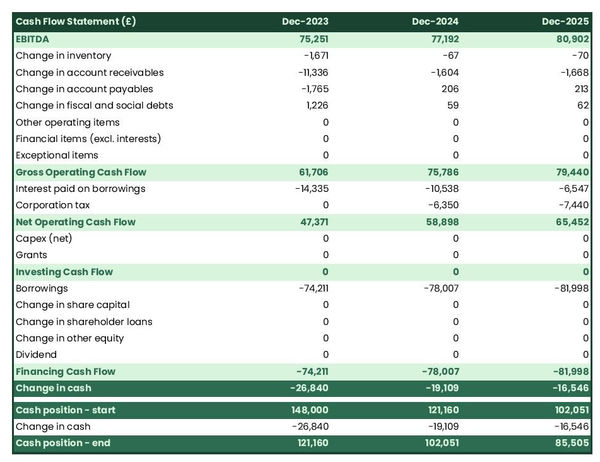
It is best practice to organise the cash flow forecast by nature to better explain where cash is used or generated by the sound recording studio:
- Operating cash flow: shows how much cash is generated by the operating activities
- Investing cash flow: shows how much will be invested in capital expenditure to maintain or expand the business
- Financing cash flow: shows if the business is raising new capital or repaying financiers (debt repayment, dividends)
Keeping an eye on (and regularly updating) your sound recording studio's cash flow forecast is key to ensuring that your business has sufficient liquidity to operate normally and to detect financing requirements as early as possible.
If you are trying to raise capital, you will normally be asked to provide a monthly cash flow forecast in your sound recording studio's financial plan - so that banks or investors can assess seasonal variation and ensure your business is appropriately capitalised.
Need a convincing business plan?
The Business Plan Shop makes it easy to create a financial forecast to assess the potential profitability of your projects, and write a business plan that’ll wow investors.

Which tool should you use to create your sound recording studio's financial forecast?
Using the right tool or solution will make the creation of your sound recording studio's financial forecast much easier than it sounds. Let’s explore the main options.
Using online financial forecasting software to build your sound recording studio's projections
The modern and easiest way is to use professional online financial forecasting software such as the one we offer at The Business Plan Shop.
There are several advantages to using specialised software:
- You can easily create your financial forecast by letting the software take care of the financial calculations for you without errors
- You have access to complete financial forecast templates
- You get a complete financial forecast ready to be sent to your bank or investors
- You can easily track your actual financial performance against your financial forecast, and recalibrate your forecast as the year goes by
- You can create scenarios to stress test your forecast's main assumptions
- You can easily update your forecast as time goes by to maintain visibility on future cash flows
- You have a friendly support team on standby to assist you when you are stuck
- It’s cost-efficient and much cheaper than using an accountant or consultant (see below)
If you are interested in this type of solution, you can try our forecasting software for free by signing up here.
Hiring a financial consultant or chartered accountant
Hiring a consultant or chartered accountant is also an efficient way to get a professional sound recording studio financial projection.
As you can imagine, this solution is much more expensive than using software. From experience, the creation of a simple financial forecast over three years (including a balance sheet, income statement, and cash flow statement) is likely to start around £700 or $1,000 excluding taxes.
The indicative estimate above, is for a small business, and a forecast done as a one-off. Using a financial consultant or accountant to track your actuals vs. forecast and to keep your financial forecast up to date on a monthly or quarterly basis will naturally cost a lot more.
If you choose this solution, make sure your service provider has first-hand experience in your industry, so that they may challenge your assumptions and offer insights (as opposed to just taking your figures at face value to create the forecast’s financial statements).
Why not use a spreadsheet such as Excel or Google Sheets to build your sound recording studio's financial forecast?
You and your financial partners need numbers you can trust. Unless you have studied finance or accounting, creating a trustworthy and error-free sound recording studio financial forecast on a spreadsheet is likely to prove challenging.
Financial modelling is very technical by nature and requires a solid grasp of accounting principles to be done without errors. This means that using spreadsheet software like Excel or Google Sheets to create accurate financial forecasts is out of reach for most business owners.
Creating forecasts in Excel is also inefficient nowadays:
- Software has advanced to the point where forecasting can be done much faster and more accurately than manually on a spreadsheet.
- With artificial intelligence, the software is capable of detecting mistakes and helping decision-making.
Spreadsheets are versatile tools but they are not tailor-made for reporting. Importing your sound recording studio's accounting data in Excel to track actual vs. forecast is incredibly manual and tedious (and so is keeping forecasts up to date). It is much faster to use dedicated financial planning tools like The Business Plan Shop which are built specially for this.
Need a convincing business plan?
The Business Plan Shop makes it easy to create a financial forecast to assess the potential profitability of your projects, and write a business plan that’ll wow investors.

Use our financial projection templates for inspiration
The Business Plan Shop has dozens of financial forecast templates available.
Our examples contain a complete business plan with a financial forecast and a written presentation of the company, the team, the strategy, and the medium-term objectives.
Whether you are just starting out or already have your own sound recording studio, looking at our financial forecast template is a good way to:
- Understand what a complete business plan should look like
- Understand how you should model financial items for your sound recording studio
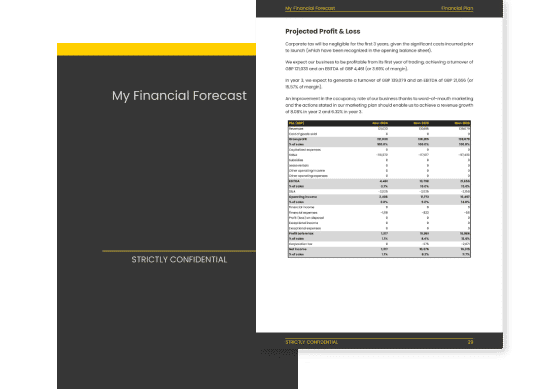
Takeaways
- A financial forecast shows expected growth, profitability, and cash generation metrics for your sound recording studio.
- Tracking actuals vs. forecast and having an up-to-date financial forecast is key to maintaining visibility on your future cash flows.
- Using financial forecasting software is the modern way of creating and maintaining financial projections.
We hope that this guide helped you gain a clearer perspective on the steps needed to create the financial forecast for a sound recording studio. Don't hesitate to contact us if you have any questions!
Need a convincing business plan?
The Business Plan Shop makes it easy to create a financial forecast to assess the potential profitability of your projects, and write a business plan that’ll wow investors.

Also on The Business Plan Shop
- Financial forecast example
- How to project sales for a business?
- Sample financial forecast for business idea
Know someone who runs a sound recording studio? Share our business guide with them!



